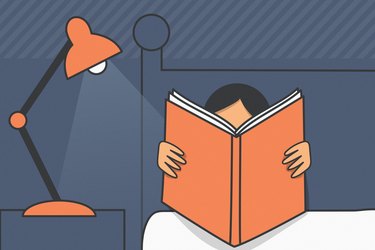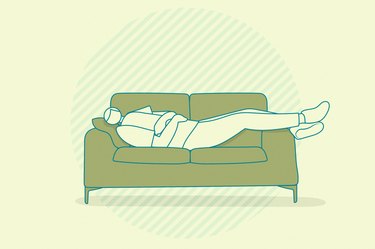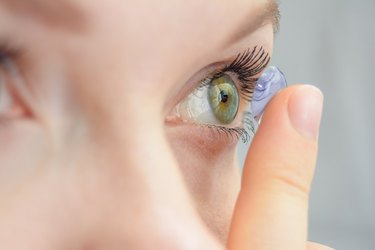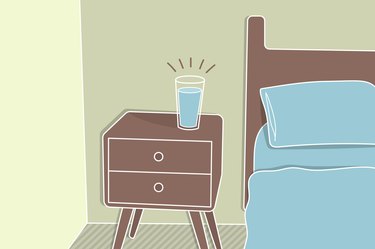
There's something maximally cozy about curling up with a good book at night, especially in the winter. And while low lighting only adds to the hygge vibes, can reading in the dark hurt your eyes?
Reading with less-than-optimal brightness isn't going to wreck your vision. "Our eyes are designed to adjust to various light levels and will automatically adjust when we strain to read a book in low or dim lighting," explains Luis Rojas, OD, a therapeutic optometrist at DeNovo Eye in McKinney, Texas, and a consultant for Johnson & Johnson Vision.
Video of the Day
Video of the Day
That said, the habit can make you uncomfortable, and these problems can add up over time. Here, Dr. Rojas explains why, plus what you can do to make reading in dim light easier on your eyes.
What Happens When You Read in Dim Lighting?
It's certainly possible to read in dim lighting. But you'll probably have to squint or strain your eyes in order to do so, Dr. Rojas points out. After a few pages, you might start to notice that your eyes feel tired, your vision gets blurry or that you're starting to get a headache.
Your eyes might start to feel dry or irritated too.
"Our eyes need constant lubrication in order to moisturize and protect the ocular surface from dryness as well as help us see clearly," Dr. Rojas says. "Prolonged reading in low light can reduce your overall contrast, making it more difficult to read efficiently, and in turn, cause you to blink less often, which can lead to dryness."
Try to push on and keep reading anyway, and the effects can start to spiral. Darkness causes your pupils to dilate, which can cause the words on the page to become glaring or distorted. "This can subsequently lead to more squinting in order to see the words more clearly, which can result in eye fatigue," Dr. Rojas says.
If you're craning your neck to get closer to the page, you might start to get an uncomfortable crick too. (These problems can all become more noticeable as you age, by the way.)
Thankfully, these problems won't do your eyes any long-term damage, Dr. Rojas says. But read on for tips on how to reduce the short-term side effects.
Ways to Treat Your Eyes Well
An easy way to reduce eye strain — and the discomfort that comes with it — is to read in light that feels adequately bright, Dr. Rojas points out. Instead of reading in the dark, try positioning your light source behind you, so the light gets directed onto the page, per the Mayo Clinic. If you're squinting or straining to see, that's a sign you should reposition your light or turn on another lamp.
And by the way, adjusting the room's brightness level isn't the only way to take care of your eyes. Eye strain can happen any time you spend prolonged periods staring at books or screens, whether you're sitting in darkness or not, Dr. Rojas says.
To keep your peepers more comfortable, you should:
- Take frequent eye breaks: The number-one way to prevent eye strain is simple: When reading or using the computer, look away every 20 minutes, for 20 seconds, at something 20 feet away.
- Limit screen and reading time: Try not to read or use the computer for hours on end without interruption.
- Use artificial tears: Eye drops can help keep your eyes hydrated if they tend to get dry from reading for long stretches. Try Refresh Digital PF Lubricant Eye Drops ($12, Amazon). The "PF" in the name stands for preservative-free, which lowers the odds of eye irritation.
- See your eye doctor: Blurred vision, itchy eyes, chronically dry eyes, sensitivity to light and headaches could indicate an underlying eye problem.
So, How Bad Is It Really to Read in Low Light?
Reading in low light won't harm your eyes or your vision. "It's not directly harmful," Dr. Rojas says.
But it can make reading less enjoyable, because a dim space can lead to eye strain, dry eyes, trouble seeing clearly and even headaches. So if you want to stay comfortable, turn up the light.
Was this article helpful?
150 Characters Max
0/150
Thank you for sharing!
Thank you for your feedback!
Is this an emergency? If you are experiencing serious medical symptoms, please see the National Library of Medicine’s list of signs you need emergency medical attention or call 911.



